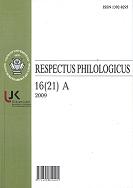TWO WAYS LEADING TO MODERN NA¬TIONAL CULTURE: VINCAS KUDIRKA AND JURGIS BALTRUŠAITIS
DU KELIAI Į MODERNIĄJĄ NACIONALINĘ KULTŪRĄ: VINCAS KUDIRKA IR JURGIS BALTRUŠAITIS
Author(s): Ugnius KeturakisSubject(s): Language and Literature Studies
Published by: Vilniaus Universiteto Leidykla
Keywords: Messianist cultural myths of the Russian Empire and the Kingdom of Poland; socio-cultural breeding; modern Lithuanian consciousness and culture;
Summary/Abstract: The article deals with the national identity of two Lithuanian writers – Vincas Kudirka and Jurgis Baltrušaitis – and it explores their path from Lithuania, which is regarded as nature, opposing to culture, to two foreign cultural centres – Warsaw (Kudirka) and Moscow (Baltrušaitis), thus adopting the unionistic culture of the Kingdom of Poland and imperial culture of the Russian Empire, respec¬tively. Theses aristocratic cultures were seeking for absolute values, strictly separating the spheres of high and low (where, according to the whole hierarchical sociocultural structure, the Lithuanian culture belonged to). After the defeat of the 1831 revolt against the Czar, which attempted to restore the Kingdom of Poland, the poet Mickiewicz in his poetical works, drawing parallel between the fate of the Kingdom of Poland and the torments of Jesus Christ, established the new concept of unionistic identity – messianism. Vincas Kudirka who studied the literature of Polish romantics had the notion of messianism of the Kingdom of Poland and its po¬litical and sociocultural structure was confronted at the university of Warsaw by the new ideology of positivism, which, born after the defeat of the 1863 revolt against the Czar, criticized the romantic hopes of national messiah and proposed the whole new democratic ideology of so called “organic work” and of “laying of foundations”. This ended in the shift of Kudirka’s consciousness towards his roots, implicating the foundation of modern national Lithuanian culture. Jurgis Baltrušaitis started studying at Moscow University in 1893, at the time of the so called the renaissance of the Russian culture. Russian sym¬bolists, on the basis of slavophilic myth and the notion of messianism of the Russian imperial cul¬ture – implicating the priority of one culture above the others, including Lithuanian, – speculated on the new art, which would cross all boundaries and unify the whole life in one, positioning themselves as its pioneers. Baltrušaitis understood the Russian Em¬pire and its political and sociocultural structure as the guarantee of this unification and the progress in abso¬lute. After the Russian revolution of the 1917, when the idea of political, material and cultural absolutism collapsed, Jurgis Baltrušaitis adopted the notion of multiculturalism, abandoned the idea of one absolute culture and validated the right to Lithuanian culture to exist among the plurality of parallel cultures.
Journal: Respectus Philologicus
- Issue Year: 2009
- Issue No: 16 (21) A
- Page Range: 93-104
- Page Count: 12
- Language: Lithuanian

